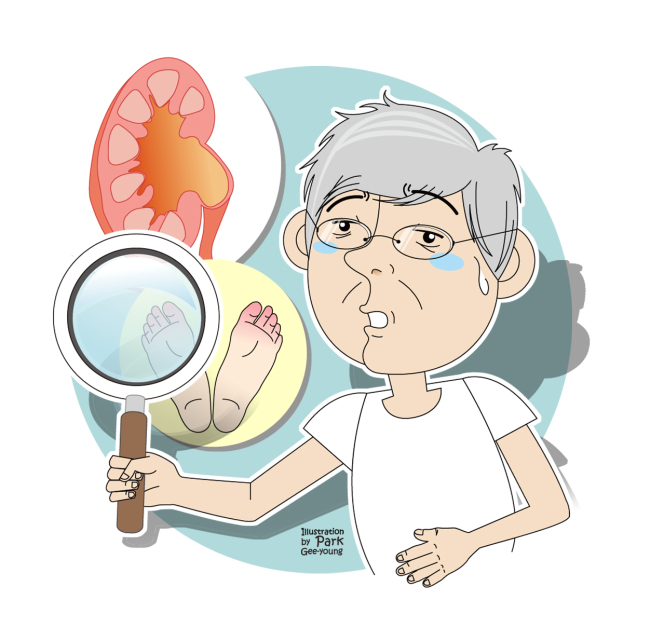With an aging society and increase in obesity, the number of diabetes patients is increasing each year. This is associated with an increase in chronic complications of diabetes.
Diabetic kidney disease is the most common cause of end-stage renal disease, and is the most serious complication of diabetic patients. Therefore, the presence of diabetic kidney disease is an important prognostic factor for diabetic patients. Here, I will discuss the risks, prevention and management of diabetic kidney disease.
How is diabetes related to the kidneys?
The chronic elevation of blood glucose in diabetic patients leads to various complications. The complications of diabetes can be divided into macrovascular and microvascular complications. The kidneys contain small blood vessels, and are the main organ affected by diabetes.
Diabetic kidney disease is the most common cause of end-stage renal disease, and is the most serious complication of diabetic patients. Therefore, the presence of diabetic kidney disease is an important prognostic factor for diabetic patients. Here, I will discuss the risks, prevention and management of diabetic kidney disease.
How is diabetes related to the kidneys?
The chronic elevation of blood glucose in diabetic patients leads to various complications. The complications of diabetes can be divided into macrovascular and microvascular complications. The kidneys contain small blood vessels, and are the main organ affected by diabetes.

Diabetic kidney disease leads to proteinuria in the early stages, and gradually leads to declining kidney function. This in turn leads to various problems including accumulation of waste products, electrolyte disturbance and anemia.
Who develops diabetic kidney disease and how can it be prevented?
The prevalence of diabetic kidney disease in type 1 and 2 diabetic patients is approximately 30 percent. Diabetic kidney disease usually arises after five years of having diabetes. Those with type 2 diabetes have a higher chance of developing the disease earlier, which is why they should be aware of kidney disease from the diagnosis of diabetes.
Diabetic kidney disease is more common in those with higher blood glucose levels, those with obesity, and those who are smokers. The disease tends to progress more quickly in these people. Therefore, it is important to manage these risk factors to prevent diabetic kidney disease. Strict management of blood glucose, weight control and not smoking can help prevent the progression of diabetic kidney disease.
How can kidney complications be identified in diabetic patients?
There are no objective symptoms of early kidney disease. Often, in diabetic kidney disease, the absence of symptoms does not necessarily indicate the absence of any kidney problems. Therefore, diabetic patients need regular tests for complications.
The earliest indication of diabetic kidney disease is microalbuminuria, which can be identified by urine tests. Patients with type 1 diabetes should have tests for microalbuminurias every year starting 5 years after diabetes diagnosis, whereas patients with type 2 diabetes should be tested every year from the time of diagnosis. The presence of albumin in urine suggests diabetic kidney disease.
However, some people may have declining kidney function without albuminuria, which is why serum creatinine levels are also measured to assess kidney function. Patients with diabetic kidney disease often also develop hypertension, so the diabetic patients with hypertension should be observed closely for the development of diabetic kidney disease. Diabetic kidney disease can lead to edema and nocturia in its late stages. However, these are also caused by other diseases, which is why the patient needs to be tested further to make the diagnosis.
I have been diagnosed with kidney complications while under management for diabetes. What do I need to do now?
Once you develop diabetic kidney disease, efforts should be made to delay its progression rather than trying to achieve a cure. Diabetic kidney disease progresses gradually, but the rate of progression varies widely. It can be delayed by using appropriate medication and making lifestyle changes. The most important thing is to manage your blood glucose levels.
Hyperglycemia increases the risk of developing diabetic kidney disease, and contributes to the progression of the disease, which is why it is so important to manage blood glucose levels. To do this, you should maintain a regular and appropriate diet, as well as regular exercise. You should also be prescribed diabetic medications and insulin by your doctor. The target blood glucose level is 70-130 fasting, under 180 two hours after a meal, and HbA1c of 7 or less.
The second important thing is managing your blood pressure. Patients with diabetic kidney disease often have hypertension, and uncontrolled hypertension can lead to worsening of proteinuria and significant decline in kidney function. Control of blood pressure may be easier than controlling diabetes, and the effect of blood glucose is more significant on the kidneys, which is why managing blood glucose may be more important than managing hypertension. For effective control of blood pressure, it is important to maintain a low-salt diet, exercise regularly and lose weight. The salt intake per day should be 2.3 grams or less for a low-salt diet. You can try the following to eat a low-salt diet: use soy sauce, garlic, onions or lemon instead of salt when cooking. Cook food without using salt, then add salt as needed before eating. Check the salt content of foods when purchasing foods, and write a food diary.
It is also important to use antihypertensive medicines together with dietary modification. A certain class of antihypertensive agents may be helpful, so you should discuss this with your doctor. Often, a single type of antihypertensive may not be sufficient to reach the target blood pressure, so you may need several types of antihypertensives. The target blood pressure is 130 mmHg systolic, and 80 mmHg diastolic.
Smoking is a major factor that contributes to the progression of diabetic kidney disease and can cause cardiovascular complications, so you should stop smoking. The aim of diabetic kidney disease treatment is to prevent the progression of renal failure, while also preventing the development of cardiovascular complications. For this, you should manage blood pressure and blood glucose, and make lifestyle modifications. There is no definitive treatment for diabetic kidney disease, so you should avoid using untested treatments without discussing this with your doctor.
Lastly, if you already have late-stage renal failure from diabetic kidney disease, it is recommended that you undergo dialysis treatment at an appropriate time. This is because renal failure leads to accumulation of waste products that can cause serious problems in not only the kidneys, but also other organs. A kidney transplant is another option for diabetic patients, so make sure that you discuss all the options with your specialist doctor.

By Lee Jung-eun
The author is a doctor in the Division of Nephrology at Samsung Medical Center and a professor of Sungkyunkwan University School of Medicine. ― Ed.
-
Articles by Korea Herald






![[From the Scene] Monks, Buddhists hail return of remains of Buddhas](http://res.heraldm.com/phpwas/restmb_idxmake.php?idx=644&simg=/content/image/2024/04/19/20240419050617_0.jpg&u=20240419175937)








![[From the Scene] Monks, Buddhists hail return of remains of Buddhas](http://res.heraldm.com/phpwas/restmb_idxmake.php?idx=652&simg=/content/image/2024/04/19/20240419050617_0.jpg&u=20240419175937)

![[KH Explains] Hyundai's full hybrid edge to pay off amid slow transition to pure EVs](http://res.heraldm.com/phpwas/restmb_idxmake.php?idx=652&simg=/content/image/2024/04/18/20240418050645_0.jpg&u=20240419100350)

![[Today’s K-pop] Illit drops debut single remix](http://res.heraldm.com/phpwas/restmb_idxmake.php?idx=642&simg=/content/image/2024/04/19/20240419050612_0.jpg&u=)